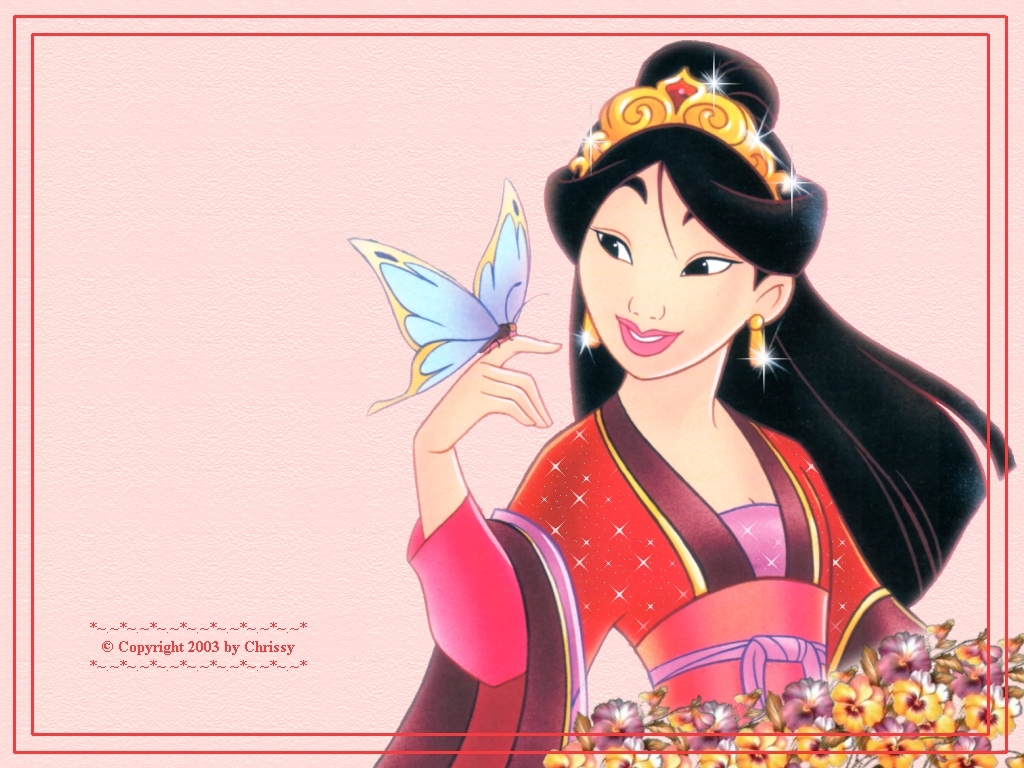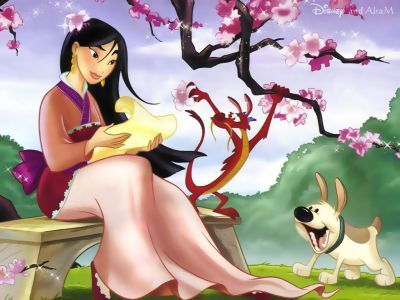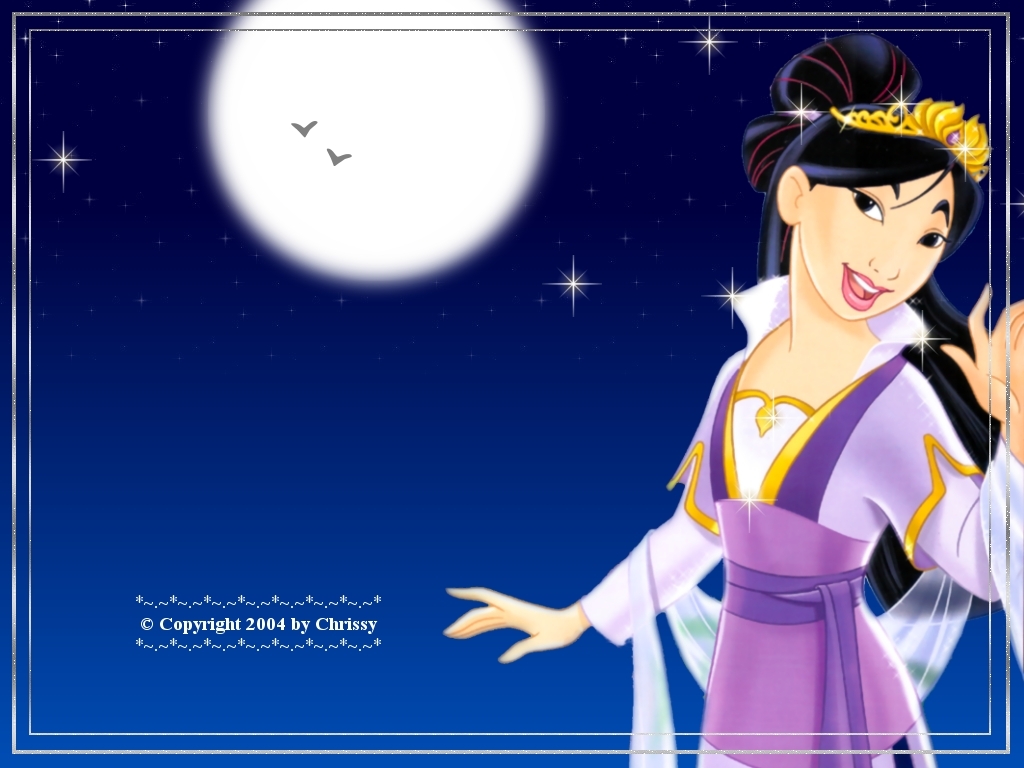Mulan – Reflection (Disney 1998)
Look at me, you may think you see
Who I really am
But you’ll never know me
Every day, is as if I play apart
Now I see, if I wear a mask
I can fool the world
But I cannot fool…my heart
Who is that girl I see
Staring straight back at me?
When will my reflection show
Who I am inside?
I am now, in a world where I have to
Hide my heart
And what I believe in
But somehow, I will show the world
What’s inside my heart
And be loved for who I am
Who is that girl I see
Staring straight back at me?
Why is my reflection show
Someone I don’t know?
Must I pretend that I’m,
Someone else for all time?
When will my reflection show
Who I am inside?
There’s a heart that must be free to fly
That burns with a need,
To know the reason why,
Why must we all conceal
What we think
How we feel
Must there be a secret me
I’m forced to hide?
I won’t pretend that I’m someone else,
For all time
When will my reflections show
Who I am inside?
Thai Version by Ladymoon
ดูฉันให้ดีๆ
เธออาจคิดว่าเธอเห็น
ว่าแท้จริงฉันคือใคร
แต่เธอยังไม่รู้จักฉันดี
ทุกวันฉันต้องเล่นละคร
ฉันเข้าใจแล้ว
ว่าถ้าฉันสวมหน้ากาก
ฉันหลอกคนทั้งโลกได้
แต่หลอกหัวใจตัวเองไม่ได้
ผู้หญิงคนนั้นที่ฉันเห็นคือใคร
คนที่จ้องมองตอบกลับมา
เมื่อไหร่เงาสะท้อนจะเผยตัวตน
ที่อยู่ข้างในของฉันออกมา
ตอนนี้ฉัน
อยู่ในโลกที่จำต้องอยู่
ปิดบังหัวใจตัวเอง
ซุกซ่อนสิ่งที่ฉันเชื่อ
แต่สักวัน
ฉันจะเปิดเผยให้โลกรู้
สิ่งที่อยู่ในใจของฉัน
และรักฉันอย่างที่ฉันเป็น
ผู้หญิงคนนั้นที่ฉันเห็นคือใคร
คนที่จ้องมองตอบกลับมา
ทำไมเงาถึงสะท้อนภาพ
คนที่ฉันไม่รู้จัก
ฉันต้องเสแสร้ง
เป็นคนอื่นอยู่ตลอดเวลาอย่างนั้นหรือ
เมื่อไหร่เงาสะท้อนจะเผยตัวตน
ที่อยู่ข้างในของฉันออกมา
ยังมีหัวใจที่ใฝ่ฝัน
อยากจะโบยบินอย่างเสรี
ใจที่รุ่มร้อนด้วยความปรารถนา
อยากรู้เหตุผล
ทำไมเราต้องปิดบัง
สิ่งที่เราคิด
สิ่งที่เรารู้สึก
เป็นเพราะความลับที่มี
บังคับให้ฉันต้องหลบซ่อนใช่มั้ย
ฉันไม่อยากเสแสร้ง
เป็นคนอื่นอยู่ตลอดเวลา
เมื่อไหร่เงาสะท้อนจะเผยตัวตน
ที่อยู่ข้างในของฉันออกมา
---------------------------------------

เรื่องย่อ : มู่หลาน (ภาพยนตร์การ์ตูน โดย วอล์ท ดิสนีย์ )
ณ กำแพงเมืองจีนมีทหารคนจีนกำลังตรวจตรากำแพงอยู่ในขณะเดียวกันได้พบกับชาวฮ่นกำลังปีนขึ้นมาบนกำแพงเมืองจีน ทหารชาวจีนก็หาทางหนีพวกชาวฮั่นให้ได้แต่ชาวฮั่นได้รุมเขาไว้จนได้เจอกับ ฉาง หยูพร้อมด้วยอินทรีคู่ใจของเขา จนเห็นแล้วจุดไฟส่งสัญญาณไปถึงพระราชวัง จนแม่ทัพรู้เข้าก็เลยไปในวังบอกกับฮ่องเต้ว่า พวกฮั่นขึ้นกำแพงเมืองจีนมาบุกเมืองเราแล้ว ฮ่องเต่รู้ดีว่าชาวฮั่นบุกมา จนเตรียมกองกำลังให้พร้อมที่จะต่อสู้กับชาวฮั่น ต่อมาในบ้านของมู่หลาน ได้เขียนลายเซ็นบนแขนของเธอเพื่อที่จะไม่ลืมตอนที่จะแสดงฝีมือในการอวดโฉมงามในงานของเธอ จนสุนัขของเธอได้คาบกระดูกมาจนพ่อของมู่หลานั้นได้สวดมนต์ภาวะนาในศาลเจ้า เพื่อจะให้คุ้มครองมู่หลานให้เป็นแม่ซื่อในวันนี้
วันหนึ่งสุนัขลากมาพร้อมด้วยถุงเมล็ดข้าว จนไก่เต็มไปหมดในศาลเจ้า จนเขาต้องสวดมนต์อีกครั้ง พอเขาสวดมนต์เสร็จ เขาได้พบกับลูกสาวที่เก็บเป็นความลับเรื่องเขียนลายเว็นที่แขน จนต่อมาในเมืองแม่ของมู่หลานกับยาย เดินทางในเมืองและแล้วยายจึงได้ตัดสินใจเอา จิ้งหรีดที่มีนามว่าคริกครี่ จนยายต้องปิดตาเพื่อฝึกความสามารถของคริกครี่ คุณแม่ของมู่หลานสั่งห้ามไม่ให้ยายเดินไปที่มีอันตรายมากเกินไป จนยายหลบไปได้ทัน จนแม่ของมู่หลานเธอได้เห็นชุดของมู่หลานสกปรกก็เลยแต่งตัวเพื่อรีบไปประกวดโฉมงามประจำปีนี้ เมื่ออาบน้ำและแต่งตัวเสร็จแล้ว ก็ไปต่อคิวตามพวกสาวๆคนอื่นไป จนพบกับอาจารย์ประกวดโฉมงามและเรียกเธอให้ไปเข้าบ้านของอาจาร์ยเพื่อที่จะดูว่าเธอดูดีมาดหรือเปล่าแต่อาจาร์ยบอกว่า ผอมเกินไปนิดไม่เหมาะแก่การเป็นแม่พันธ์ซะเลย
มู่หลานกล่าวว่า ขอโทษค่ะ อาจาร์ยพูดอย่างเสียงดังว่า และก็หักสงบปาก จนอาจาร์ยดื่มถ้วยชาแต่มีคริกครี่อยู่ในถ้วย มู่หลานเห็นคริกครี่ตกไปอยู่ในแก้วชา ก็ตัดสินใจเอาถ้วยชาคืน อาจาร์ยก็ไม่ให้ แต่มู่หลานใช้พัดปัดคริกครี่ออกแต่ไปเกิดจุดไฟเข้าของก้นอาจาร์ยทันที จนเกิดเรื่องไม่ดีขึ้นในบ้านของเธอ พออาจาร์ยออกนอกบ้านเพื่อจะหาคนที่มาดับไฟช่วยเธอ จนมู่หลานราดน้ำชาใส่เธอจนเธอต้องลาออกไป ต่อมามู่หลานได้ร้องเพลงที่ไม่ดีเรื่องความไม่สำเร็จนี้ เรื่องหญิงงาม จนพอร้องเสร็จเลยนั่งใกล้เคียงกับต้นไม้ และพ่อของเธอก็มาพูดว่า ปีนี้ดอกท้อบ้านเราบ้านกระทั่งไปทั้งปี ดูนีสิดอกท้อก็ยังไม่บานแต่มั่นใจว่าพอที่จะมันบาน นั่นจะเป็นดอกท้อที่งดงามแต่อย่างใด พูดจบก็ได้ยินเสียงกลองบนหอว่ามีข้าราชการจากสำนักส่งเอกสารเพื่อจะไปรบ มู่หลานจึงกลัวและเป็นห่วงพ่อมากถ้าคิดว่าพ่อของเธอจะตายตอนที่โดนรบ และมู่หลานก็สั่งห้ามไม่ให้ยุ่งกับพ่อแต่ฉิงฟู ควางไว้ ว่าเจ้าต้องเห็นแก่บุรุษซะบ้าง ต่อมาพ่อของเธอได้ไปที่ห้องเสื้อผ้าเพื่อเตรียมรบและเขาก็หยิบดาบเพื่อจะฝึกการรบจนเขาปวดหลัง และเขาก็หยิบเอกสารจากสำนักอยู่ในมือของเขา
จนวันหนึ่งครอบครัวตระกูลฮัวกำลังทนข้าวกันอยู่มู่หลานเริ่มรู้สึกเริ่มอารมด์ไม่ดีเรื่องพ่อของเธอจะตายในการรบครั้งนี้ ก็เลยใช้แกวทุบโตะเสียงดัง และสั่งไม่ให่พ่อไปรบกัน พ่อจึงไม่สนใจเพื่อจะรบในการช่วยเหลือประเทสจีนให้อยู่รอดเนื้อมือของพวกฮั่นที่จะมาโจมตีในครั้งนี้ มู่หลานเริ่มรู้สึกเสียใจมาก เธออกจากบ้านนั่งร้องไห้และหาทางคิดว่าจะทำยังไงดีเพื่อจะไม่ให้พ่อของเธอออกไปรบ มู่หลานตัดสินใจงโขมยชุดเกราะของเขาไปพร้อมด้วยคาน ม้าศึกคู่ใจของมู่หลาน และมู่หลานก็หนีออกจากบ้านไป และยายก็ตกใจตื่นขึ้นมาไม่เห็นมีมู่หลานเลย จึงบอกพ่อกับแม่ว่า มู่หลานหนีไปแล้ว เขาได้ไปที่ห้องแต่ชุดเกราะที่อยู่มันหายไปแล้ว จนเขาวิตกกังวลว่าลูกจะตายไป เขาและภรรยาจึงออกนอกบ้านท่ามกลางสายฝน ทั้งคู่ก็เสียใจมากคิดว่าจะสียลูกสาวไป จนยายต้องอ้อนวอนว่าขอให้บรรชนฮัวปกป้องคุ้มครองมู่หลานด้วยเถิด และในศาลเจ้าเริ่มปรากฏตัวหัวหน้าวิญญาณและเขาปลุกมูชูมังกรสีแดงออกมา และเขาได้ปลุกพวกวิญญาณทั้งหมดจนมีเหตุเรื่องมู่หลานของไปรบจนบรรดาเหล่าวิญญาณพูดคุยกัน จนหัวหน้าได้ไปเจอกับมังกรหินอยู่ข้างนอกและจะให้ปลุกมันตื่นขึ้น มูชูก็ไปช่วยปลุกแต่มังกรไม่ยอมตื่น จึงต้องตีหัวเพื่อจะตื่นอีกทีจนรูปปั้นก็หักพังลง จนมูชูเสียดายมากตอนที่รูปปั้นนั้นพังยับเยินหมด จนเขาได้พบกับคริกครี่ได้พามูชูไปหามู่หลาน
ขณะนั้นมู่หลานกำลังฝึกอยู่ในป่าไผ่พร้อมคาน แต่เธอได้ยินเสียงประหลาดดังขึ้น จนมู่หลานและคานต้องหลบหนีไปในก้อนหิน พอพูดเสร็จก็ปรากฏโฉมหน้าที่มู่หลานไม่รู้จัก เขาแนะนำชื่อของเขาจนเสร็จแล้ว ทั้งหมดได้เข้าค่ายทหารรบของชาวจีน จนมู่หลานได้พบกับชายแปลกๆบ้าง แต่มู่หลานได้เห็นคนสักยันตร์มังกรในค่ายจนเหยาได้ทุบหน้าอกจนสลบไป จนก่อกวนไปทั่วค่าย ในค่ายของฉางและแม่ทัพได้ตรวจดูการบุกรุกชาวฮั่นที่พร้อมจะโจมตี และแม่ทัพได้ออกไปต่อสู้กับชาวฮั่นไป ฉางได้เห็นคนทะเลาะกันว่ามีอะไรผิดปกติ พวกทหารชี้ศัตรูที่มาก่อกวนในค่ายนี้ ฉางได้ไปหาทหารแปลกหน้า และสั่งไม่ให้บุกรุกก่อกวนในค่ายนี้ ฉางบอกชื่อแต่มุชูตัดสินใจเป็น ผิง และฉางได้ยิงธนูถูกเสาที่สูงมาก ต้องพยายามเก็บมาให้ได้ วันหนึ่งมู่หลานได้ออกฝึกในค่ายและนอกค่าย มู่หลานพยายามฝึกวิชาในค่ายทหารอย่างเต็มที่
พอตกกลางคืนมู่หลานตั้งใจที่จะเก็บลูกธนูมาให้ได้ และได้เก็บลูกธนูไป ต่อมาฉางหยูกับลูกสมุนของเขา ได้เตรียมกองกำลังเอาไว้ ฉาง หยู ได้พบกับตุ๊กตาพูดว่ากำลังจะไปคนเธอ และมู่หลานก็อาบน้ำ ได้พบกับ หลิน เฉียน โป และ เหยา ลงมาเล่นน้ำด้วย หลินได้แกล้งทหารแปลกหน้า มู่หลานก็ขึ้นไปจากฝั่ง ได้มีทหารต่างๆวิ่งไปหมดที่จะเล่นน้ำด้วยกัน มูชู กับ คริกครี่ได้เขียนจดหมายเรื่องทัพสงคราม ให้กับ ฉี ฟู เขารู้ว่าจะเตรียมให้พร้อมพรุ่งนี้ มู่หลาน มู่ชูและครอครี่ พร้อมด้วยทหารต่าง ฉาง และ ฉี ฟู ออกเดินทางไป จนได้พบกับหมู่บ้านที่ถูกไฟเผาหมด ฉางกังวลว่าพ่อเขาอยู่หรือเปล่าฉี ฟู เรียก ฉางให้มาดู แต่เขาเห็นทหารตายอยู่ข้างล่าง เฉียน โป ได้เอาหมวกพ่อ ฉาง ได้เอาดาบปักพร้อมด้วยหมวกของพ่อ เสร็จแล้วก็ออกเดินทางต่อไป และแล้วสิ่งไม่ดีก็เกิดขึ้นมาคือกองทัพชาวฮั่นที่ยิงธนูใส่พวกทหาร พรรคพวกก็หลบหนีตั้งแผน พร้อมยิงปืนใหญ่ ยิงใส่ พอสักพัก ได้เห็นฉาง หยูกับม้าศึก พร้อมลูกสมุนจำนวนมาก ฉาง หยู พร้อมเตรียมโจมตีข้างหน้า มู่หลานเอาปืนใหญ่เพื่อยิงใส่ภูเขาลูกโน้น แต่มูชูติดอยู่ จนระเบิดใส่พวกกองทัพฮั่น ฉาง หยู โกรธมากที่ทำกับลูกสมุนของเขาตาย ฉาง หยูใช้ดาบใสที่ท้องเธอ นายกองฉางได้ช่วยชีวิตเธอ ได้หนีไปหิมะกำลังถล่ม พอหิมะหยุดถล่มสักพัก เธอได้รับบาดเจ็บ ตอนที่เธออยู่ที่เต้นท์พยาบาล ฉาง ได้เข้าไปดูว่าเธอตื่นขึ้นมาเห็นว่ามรที่ปิดหน้าอกไว้ และฉี ฟู รู้เข้าเห็นว่าไม่เป็นทหารแปลกหน้าผู้ชายแต่เป็นผู้หญิง ฉี ฟู สั่งให้ฉาง หยูเอาดาบเพื่อที่จะฆ่าเธอ มูชู คริกครี่ และ ทหารก็คิดว่าไม่น่าจะฆ่าเธอเลย เพื่อที่จะช่วยเธอ จนฉี ฟู ห้ามไว้ฉางจึงตัดสินใจไม่ฆ่าเธอ ฉาง ก็สั่งพวกทหารออกเดินทางไปวังหลวง ไปที่ฮั่นฉาง หยูก็เห็นศัตรูถูกถลบ่มหิมะตายไปหมด ฉาง หยู เริ่มโกรธและโมโหมากจนร้องเสียงดังไปทั่ว และทหารของเขาได้ยินก็โผล่ออกมา พร้อมจะตะลุยไปวังหลวงเช่นกัน มู่หลานคิดว่าจะฆ่าฮ่องเต้เช่นกัน จึงเอาคานม้าคู่ใจของเธอ และไปวังหลวงทันที
ในเมืองมีเทศกาลจีนขบวนแห่ มู่หลานบอกกับฉางว่า พวกกองทัพฮั่นจะบุกโจมตีวัง ฉางก็ไม่สนใจที่เธอพูดเลย และไม่เชื่อเธอ กองทัพทหารซ่อนเป็นนักแสดงเชิดสิงโต พอไปถึงวังหลวง ฉาง หยูมอบดาบของพ่อ พอมอบดาบอินทรีได้โขมยให้ฉาง หยู และลูกสมุนได้จับตัวฮ่องเต้ไปเข้าวัง พวกทหารได้เอารูปปั้นสิงโตเพื่อเปิดประตู การเปิดประตูใช้ไม่ได้ผลเพราะถูกล็อกเอาไว้ มู่หลานได้แผนแล้วเรียก หลิน เฉียน โป และ เหยา ได้แต่งตัวเป็นผู้หญิงที่จะหลอกล่อชาวฮั่น แต่มีนายกองฉางมาด้วย และได้ปีนเสาขึ้นวังเพื่อจะช่วยฮ่องเต้ ทั้งหมดรีบจัดการกับพวกชาวฮั่นจนสลบไป ฉางได้ต่อสู้กับ ฉาง หยู แต่ไม่ได้ผล เฉียน โป ช่วยฮ่องเต้ออกข้างนอกวัง ฉาง หยู กับ มู่หลานได้ต่อสู้กัน มูชุเอาจรวดระเบิดพรุจน ฉาง หยูติดไว้ และแล้วฉางหยูถูกระเบิดตาย ฮ่องเต้ก็ก็พูดกับลูหลานว่า ข้าได้ยินเรื่องของเจ้ามามากฮัวนา มู่หลาน เจ้าโขมยชุดเกราะของพ่อและหนีออกจากบ้าน และแฝงตัวเป็นทหารหลอกให้นายกองหลวงเชื่อ ทำความเสื่อมแก่กองทัพจีนทำลายพระราชวังของข้าและเจ้าได้ช่วยชีวิตพวกเราทุกคน พูดจบฮ่องเต้ได้คำนัพมู่หลานที่เป็นวีรสตรีแห่งประเทศจีนนี้ ทุกคนก็เหมือนกัน เสร็จแล้วฮ่องเต้ได้มอบดาบให้แก่เธอ พร้อมด้วย สร้อยคอ พอเสร็จแล้วก็กลับไปบ้าน พ่อของเธอได้เห็นว่าเธอยังไม่ตายยังอยู่รอด พอศึกสงครามชาวฮั่นเสร็จเรียบร้อยแล้ว พอสักพักนายกอง ฉางได้เอาหมวกของพ่อมู่หลาน มูชูเตรียมจัดงานฉลองในศาลเจ้าอยู่กันอย่างมีสุขตลอดไป
ผู้กำกับ : Tony Bancroft ,Barry Cook
อำนวยการสร้าง : Pam Coats
บทภาพยนตร์ : Robert D. San Souci, Rita Hsiao
นักแสดงนำ :
Miguel Ferrer พากษ์เสียงเป็น ฉาง หยู
Lea Salonga พากษ์เสียงเป็น มู่หลาน
James Hong พากษ์เสียงเป็น ฉี ฟู
Eddie Murphy พากษ์เสียงเป็น มูชู
Harvey Fierstein พากษ์เสียงเป็น เหย
Jerry Tondo พากษ์เสียงเป็น เฉียน โป
Donny Osmond พากษ์เสียงเป็น นายกองฉาง
Source : http://disney.wikia.com/wiki/Mulan_(film), http://th.wikipedia.org/
----------------------------------
Mulan (Animation Film 1998) Research
 Mu-Lan, the Chinese Woman Warrior
Mu-Lan, the Chinese Woman WarriorBy Elisabetta LeJeune
Outline :
Thesis statement: "The Ballad of Mulan" has inspired many Chinese women to defy traditional gender roles.
I. "The Ballad of Mulan" has experienced a resurgence of popularity as Disney is making it the story of his latest animated feature. In the last five years the traditional Chinese poem has been published in various versions of children books.
II. Summary of the poem
III. Yueh Fu poetry
IV. Historical background
V. Significance of the poem in the context of Chinese literature
The recently released Disney movie Mulan portrays the Chinese heroine Mu Lan who disguised herself as a man to serve in the imperial army in place of her father. The movie is based on an ancient popular Chinese ballad which dates to the fifth century A.D. and which has been popular throughout the centuries. In 1993 China's Bravest Girl: the Legend of Hua Mu Lan told by Charlie Chin was published by the Children' Book Press followed in 1995 by The Song of Mu Lan by Jeanne M. Lee. In these two versions, the original poem is published alongside in the original Chinese (Kuo). Publishers Weekly reviewed both books and pointed out that "a simple rhyming text keeps the pace brisk in this adaptation of a fifth-century Chinese legend about a young woman who goes to war to save her family's honor". Several other books were published in 1998, the year the Disney's movie was released. Fa Mulan: The Story of a Woman Warrior, written by Robert San Souci, is the retelling of the original Chinese poem that inspired the Disney movie. "Children's book author Robert San Souci, a frequent Disney consultant, had suggested that a Chinese poem called 'The Song of Fa Mu Lan' might make good movie," report Brown, Corie and Laura Shapiro.
The original poem was written in the form of "yueh-fu" poetry by a woman named Tzu-Yeh. A translation of the Chinese poem appears in Han Frankel's book The Flowering Plum and the Palace Lady: Interpretations of Chinese Poetry, which was published in 1976. In the poem Mu-lan seems disinterested in women's chores and not ready to be married. She is rather worried about the draft which calls for each family to send a son or brother to serve the army. Quickly Mulan purchases the required equipment: a horse, a saddle, a bridle, and a long whip. She then joins the evening camps and leaves for the long journey. The refrain of the song repeats that, "She does not hear the sound of Father and Mother calling." Ten years she is gone on a journey of ten thousand miles. Then she sees the Son of Heaven, the Khan, and when he asks her what she desires as reward for those years of service, she just asks to go home. She is welcome by all her family with the addition of a Little Brother. It does not take long for Mu-lan to get back her true identity; she finds her rooms and her old clothes and resumes her feminine appearance. She attends to her appearance by fixing her hair, by now cloudlike, maybe white after those years of hard work and sacrifice. She also puts powder on her face and then goes out to see her comrades who had shared all those years on the battlefield with her. They are "amazed and perplexed" to find out that Mu-lan is a woman. The last four lines of the poem quote a reference to a male and a female hare pointing out how it is impossible to tell the sex difference when they are "running side by side close to the ground."
The poem is composed in the song form of "Yueh-fu." This style was derived from folk songs, often narrative poems accompanied by music. In 120 B.C. Emperor Wu set a Bureau of Music to provide musical entertainment during sacrifices. The officials of the bureau would collect folk songs from various parts of the country to provide inspiration for their work. Many songs in this style were imitations of those popular ballads. They were characterized by "formulaic expressions, free rhythmic patterns, often in lines of irregular length" (Chang 211). This style flourished during the Han Dynasty from 120 A.D. until 580 A.D. Many anonymous ballads are recorded in later works said to date from Han times, a dynasty which spans over 400 years (Watson 289). The Yueh-fu songs were later replaced by the tz'u form when literate poets composed new music to replace the popular music. Chang presents an example of the unclear transition between the two forms:
It can be imagined that there must have been some generic confusion between tz'u and yueh-fu at this time, especially because tz'u tunes were at first seen as new yueh-fu tunes. A telling case is Wen T'ing-yun's Yueh-fu poem Ch'un-hsiao ch'u. which also appears in his tz'u collection under the title Mu-lan hua.
While it is difficult to say whether any of these folk songs survive, certainly the ballad of Mulan has a long story of popularity. The legend of Mulan was the subject of subsequent literary works. It was developed into a novel during the late Ming (A.D. 1368-1644) Dynasty (Kuo). Mulan also became the heroine of a play by Xu Wei, who called her Hua Mulan.
The name Mu-lan appears in different spelling versions. Some sources spell her name with a hyphen and others without. In the poem the name is simply Mu-lan, but it has also been spelled as Hua Mu-lan in a collection of tzu' poems (Chang 12). The translation of "Mulan" is magnolia. "Mu" means "wood" and "Lan" means "orchid," while Hua means flower. In Chinese last names come first. Therefore, the word Hua can be considered a last name. In other sources the surname is Fa, as in Fa Mu Lan.
In China Hua Mulan is a symbol of heroic behavior. There is no certain evidence to support whether she really existed. The place of origin or the period when she lived are also not agreed upon. According to an article devoted to Mulan and part of a web site that celebrates 100 Chinese women:
One thing seems certain though. Hua Mulan was from the region known as the Central Plains. Cheng Dachang of the Song Dynasty recorded that Hua Mulan lived during the Sui and the Tang Dynasties. Song Xiangfeng of the Qing Dynasty asserted that she was of Sui origins (AD 581-618) while Yao Ying, also of the Qing Dynasty, believed she was from the time of the Six Dynasties. No record of her achievements appears in official history books prior to the Song times. Stories circulated in China's Central Plains indicate that she must have lived before the Tang Dynasty. ("100 Celebrated Asian Women")
The legend of Mulan is an example of stories of women characters who take the non traditional role of warrior. This figure that defies traditional role models had been a source of inspiration for young Chinese girls. Maxine Hong Kingston narrates the powerful memories that she recalls of growing up in a Chinese-American family. In her book The Warrior Woman: Memoirs of a Girlhood among Ghosts she tells how the story of Fa Mu Lan has symbolized the power of warrior women:
At last I saw that I too had been in the presence of great power, my mother talking-story. After I grew up, I heard the chant of Fa Mu Lan, the girl who took her father's place in battle. Instantly , I remembered that as a child I had followed my mother about the house, the two of us singing about how Fa Mu Lan fought gloriously and returned alive from war to settle in the village. I had forgotten this chant that was once mine, giving me by my mother, who may not have known its power to remind. She said I would grow up to be a wife and a slave, but she taught me the song of the warrior woman, Fa Mu Lan. I would have to grow up a warrior woman.
Original Source : http://www2.selu.edu/Academics/Faculty/elejeune/mulan.htm
----------------------------------------

Cultural awareness in Disney's Mulan for the elementary school students in Taiwan : an action research on muticultural education
Tamkang University Institutional Reponsitory
Title: 台灣小學生看迪士尼「花木蘭」的文化認知 : 一個多元文化教育的行動研究
Other Titles: Cultural awareness in Disney's Mulan for the elementary school students in Taiwan : an action research on muticultural education
臺灣小學生看迪士尼花木蘭的文化認知 : 一個多元文化教育的行動研究
Authors: 葉桂伶;Yeh, Guei-ling
Contributors: 淡江大學美國研究所碩士班
林文韵;Lin, Wen-yun
Keywords: 迪士尼;花木蘭;文化認知;多元文化教育;多元文化兒童文學;Disney;Mulan;Cultural awareness;Muticultural education;Muticultural Children's Literature
Date: 2006
Issue Date: 2010-01-06T04:43:16Z
Abstract:
一九九八年美國迪士尼公司推出第三十六部經典動畫長片「花木蘭」(Mulan),故事內容是改編中國宋朝郭茂倩所編《樂府詩集》之〈木蘭詩〉而來,上映前五週,即為迪士尼賺近一百萬美元,是繼一九九四年推出的「獅子王」以來,人氣最旺的人物,然而迪士尼對「花木蘭」的詮釋,卻引發褒貶不一的評價。首先,大眾文化(mass culture)與後現代主義(post-modernism)一派認為,電影「花木蘭」提升中華文化的傳播性、帶給觀眾歡樂、體現西方文化的思想-女性主義與個人主義、呈現電影美學之極致;然而,多元文化論述的學者可不這麼認為,他們以文化原真性(cultural authenticity)與文化正確性(cultural accuracy)的觀點評述,認為在新世紀聲光媒體不斷創新之下,兒童的讀本不再僅限於「紙本」,兒童往往先接觸影視媒體,才閱讀文本,學校教育甚至為了引起學生的學習動機與興趣,經常採納迪士尼的動畫電影融入各科教學中,特別是語文課程。他們從多元文化教育的觀點出發,認為迪士尼保裹著童話的糖衣,實際上傳遞的是西方資本主義的價值與意識型態。「花木蘭」作為一個以中國文化為題材的動畫電影,無法呈現古代中國文化的原真性,兒童年齡尚小,心理發展與價值建立的過程中,易受外力駕馭與動搖,特別像是迪士尼推出的動畫電影,視覺與聽覺效果俱佳,以華麗歌舞,可愛逗趣的小動物,幽默詼諧的手法,輕易擄獲兒童的目光,臣服於迪士尼形塑的綺麗幻想中,無形中吸納迪士尼傳遞的意識型態(Disney ideology)以及對中華文化的錯誤訊息,影響兒童文化價值觀的建立,因此,兒童欣賞迪士尼動畫電影「花木蘭」,父母與教師有必要檢視電影如何處理多元文化(multi-culture)與文化差異(culture difference)的問題,導正片中錯誤的觀點。
基於大眾文化與後現代主義一派對電影「花木蘭」的評述是普羅大眾較為熟悉觀點,又,研究者於2004年7月至2005年6月於台北縣快樂國小(假名)實習,為帶給實習班級有別於快樂國小現行多元文化教育的實施模式,以及研究者本身的好奇,遂以迪士尼動畫電影「花木蘭」為題,進行一個多元文化教育的行動研究。
本論文的研究目的在於探討研究對象對美國迪士尼動畫電影「花木蘭」的看法,能否覺知迪士尼對於中華文化的偏見、刻板印象與錯誤詮釋,藉由研究者的引領,學生能以中華文化原真性(authenticity)與正確性(accuracy)兩種視角檢視「花木蘭」,未來亦最少能以「文化原真性」與「文化正確性」兩種向度處理類似的議題。鑑於美國迪士尼處理「花木蘭」這個多元文化的議題,忽視中華文化的原真性與正確性,期望學生能藉由此次「文化學習與國際理解」融入教學中,啟發學生「文化自覺」與反省批判的能力,發展出個體多元文化的價值觀,未來面對多元文化的議題時,不僅是國內本省與外省、漢民族與少數民族(原住民)、台灣與外國,能以尊重、欣賞、包容與「同理心」的心態,處理人際間與國際間文化差異的問題,放棄本位主義,勇於查證事實,避免刻板印象,消除偏見與歧視,增進不同文化之間的和諧,培養一個宏觀的世界觀。
以下,依照本研究關注之問題,歸納研究結果作成結論如下:
一、研究者尚未介入的情況下,學生「未能」覺知迪士尼動畫電影「花木蘭」對中華文化的偏見、刻板印象與錯誤詮釋。
二、隨著教學活動的發展,學生已逐漸能以中華文化原真性與正確性兩者向度評析迪士尼動畫電影「花木蘭」。
三、本教學活動研究對象「文化自覺」的轉變,在於文化自覺由「內隱」到「外顯」的展現。
四、以「花木蘭」為例,研究對象能提出未來面對「多元文化」與「文化學習與國際瞭解」的議題時,應秉持「尊重」、「欣賞」、「包容」與「同理心」的態度。
五、針對「多元文化」與「文化學習與國際理解」的精神,學生能兼容並蓄,同時習得東西方的文化思想,以文化同理心,理解迪士尼製作小組詮釋「花木蘭」的緣由,並重新檢視自身文化的內涵,擴充認知經驗,拓展文化視野。
On June 8, 1998, the Walt Disney Company released the 36th animated film Mulan, which is an adaptation based on a Chinese poem, usually known as The Legend or The Ballad of Mu-lun. This poem, by an anonymous writer of the Southern and Northern dynasties (A.D. 420-581), has been popular for generations in China and was collected in Yuefu, the Song dynasty compendium of lyrics, songs and poems. As Disney’s Mulan is an adaptation of a legendary story remotely set in ancient China, it raises issues such as the authenticity and accuracy of Chinese culture values and facts. Critique has it that the issues of cultural authenticity and cultural accuracy become particularly important if the purpose is to evaluate the film Mulan as an art/literary work for young viewers and to investigate its influence upon children in terms of multicultural education. Particularly under the circumstances of the innovation and development of this century’s media, children’s literature has not been confined to paper books. Children often watch video tapes before they read a story if there is one available. Schoolteachers usually adopt Disney’s animated films as a motivating approach to usher children into the world of classic children’s literature. Therefore, it is crucial for schoolteachers and parents to take Mulan seriously and carefully whether to incorporate into school’s curriculum. Educators should be alert to the offensive, racially-coded language and cultural clichés presented in Mulan and discuss the stereotype and cultural distortions in Mulan with children.
Consequently, the purpose of this action research includes:
(1) to investigate students’ opinions toward Disney’ Mulan. Can they be aware of the stereotype, distortions and misinterpretations of Chinese culture in “Mulan”?
(2) to guide students to analyze and deconstruct Mulan in the perspectives of cultural authenticity and cultural accuracy so as to inspire students the importance of Chinese cultural awareness.
(3) Seeing that Disney’s treatment of Mulan can not reflect the authenticity and accuracy of Chinese culture seriously and honestly, students should take this case as a profound lesson, that is to say, try not to misinterpret or distort when dealing with multicultural issues. An attitude with respect, admiration, and heart always alike is needed when facing any micro or macro cultures if the purpose is to enhance students’ cultural learning and global understanding and establish a harmonic world in the long run.
The major findings of this study are given as follows:
1. Students can not be aware of the stereotype, distortions and misinterpretations of Chinese culture in Mulan before the researcher intervenes to inspire them the importance of Chinese cultural awareness.
2. As the development of activities, students can analyze and deconstruct Mulan in the perspectives of cultural authenticity and cultural accuracy little by little.
3. Students’ cultural awareness has changed from the state of invisibility to visibility.
4. To take Mulan for example, students can present a positive and constructive attitude to cope with multicultural issues.
5. As to the core value of multiculturalism, cultural learning and global understanding, students can gain the knowledge of both eastern and western philosophical concepts at the same time, that is to say, understand the reason why Disney animators interpret Chinese legendary story Hua Mu-lan in this way in “Mulan” and re-examine their awareness toward Chinese culture so as to expand their cultural experience and field of vision.
Description: 碩士
Appears in Collections: [美國研究所] 學位論文
Original Source : http://tkuir.lib.tku.edu.tw:8080/dspace-test/handle/987654321/20714
No comments:
Post a Comment
Note: Only a member of this blog may post a comment.